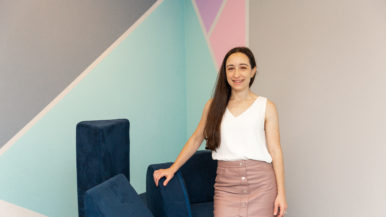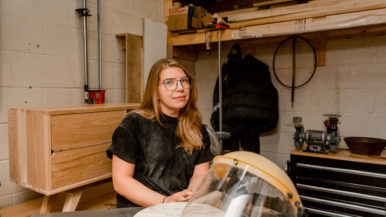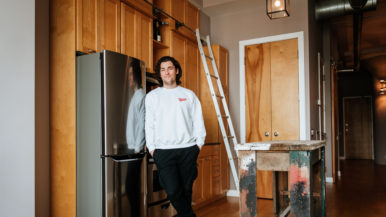“They close their eyes and get lost in song”: How a 24-year-old singer serenades the elderly via FaceTime

I loved my grandparents. I may have loved your grandparents. I’ve loved seniors who were never parents or grandparents. And as the world spirals and grows increasingly detached, I’m determined to continue loving them and keep them from becoming further isolated.
I’m a singer, actor, writer, director and visual artist in Toronto. My income is far from stable, so I juggle various part-time jobs. My favourite of them: singing to the elderly in retirement residences and long-term care facilities.
What do I sing? That varies. “Till there was You,” “Ave Maria” and “Shalom Rav” are common requests. So are standards by Ella Fitzgerald, Bing Crosby and Frank Sinatra. I tailor my repertoire and repartée as needed. I’ve learned German and Yiddish tunes. Once I went to the library in search of an old score for the Hebrew prayer esa einai. A special party trick of mine: I sing “Nostalgia in Times Square” but swap the location in the title to that of the retirement home. They love that. I often sing a capella. Other times, I play backing tracks and sing along. I sometimes get asked for jazz standards that are loud and brash enough for the listener to remove their hearing aid. That is a real treat for them. Pure, direct, unfiltered.
While I’ll sing anything, my favourites are musicals from the golden age of Broadway. Those were what my grandmother loved most. I had mild stage fright as a child until she sat me down and put on “Singing in the Rain.” She was frail and ailing, but as she watched Gene Kelly twirl around a light standard, she beamed with glee. She sang along. Eventually, I did too. I grew to love singing and performing. Years later, I trained as a classical singer and learned all the classics.
Routine means a lot to my clients. They value consistency and predictability. I have four standing dates each week. Over the years, I have learned to deal with competition from an orchestra of sounds: the beeping of blood pressure monitors, oxygen machines and respirators; the interruptions of nurses delivering meds or administering a diaper change. I usually stay for an hour or two, depending on their stamina. When the eyelids droop, I start to wrap up.
One of my clients, Claudio, is 79. He is charming and sweet, and dearly loves his native Portugal. One day, he asked me to learn the tunes of his childhood in their original language. I agreed, and laboured over the diction and the vowel sounds. On delivery, I’m pretty sure I butchered the pronunciation, but I don’t think he cared. He closed his eyes, tapped his feet and got lost in song.
Claudio had taught me his language; two weeks ago, I taught him mine: the language of technology. I had been following the news closely. I spoke to friends abroad, knew that the elderly were at heightened risk of coronavirus and that my visits would soon have to stop. So before that happened, I helped them set up Skype and FaceTime. Claudio is not a natural with gadgetry. During our first chat, he muted himself accidentally, which took a few minutes to rectify. But we eventually found our stride and he rocked to the tempo of “Young at Heart” in his rocking chair, as usual.
Mrs. Mercer is another beloved client. Her husband died 15 years ago. He was her one true love, as she tells me often. She refuses to be referred to by her first name; it’s “Mrs. Mercer” only—a tribute to her lost love. Her daughter bought her an iPhone last year, and Mrs. Mercer likes to show me pictures of her granddaughter, who just turned three. She refuses to update her software for fear of losing the images. Mrs. Mercer wears perfume of vanilla and peppermint, and the scent lingers in my hair and on my coat long after I’ve left. She and I FaceTimed each other for the first time this week, and I sang “My Funny Valentine” off the top. She told me about her day. At one point she flipped the camera the wrong way. I got a good view of her feet, then a close-up of her creaky hip. I finished with “Sentimental Journey.” Afterwards, I told her to call me whenever she feels lonely. She encouraged me to call whenever I want some company. Just not during Wheel of Fortune or Jeopardy.
Touch is a big factor in my visits. As a child, I always resented when an older relative would pinch my face. Now I understand it: the need to see, to touch, to smell, because I feel it too. I miss the way Mrs. Mercer kisses me on the cheek, staining my face with her Elizabeth Arden lipstick. It’s said to be “long-lasting”—just as Mrs. Mercer assures me she is. I miss warming up my voice as she over-sugars my orange pekoe tea. I miss holding her soft, wrinkled hands, a lifetime in every crease and sunspot. I’m afraid I’ll never smell Mrs. Mercer’s perfume again or haul Claudio up from his chair for a dance.
Many of my clients have lived through terrifying events—wars, epidemics, tragic loss—and are now battling their own diseases and comorbidities. I know I bring them joy. I’m not sure they realize how much comfort they bring me. No one knows when this new normal will end, and I’m scared. But I lift my chin, pick up my phone and begin “Singing in the Rain.”





